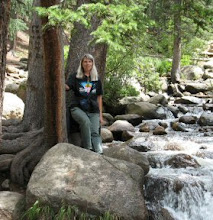I've been browsing around in Arj's blog, brand new this year, and it looks like a pretty cool place to hang out. I especially recommend his post featuring a zoom video of a Mandelbrot set! Comes with its own music, an ode to Mandelbrot himself.
What's the blog world coming to? I was happy just snagging a Fractal of the Day once in a while, and now we can zoom M-sets on You Tube! (Today's fractal is nice, but yesterday's was blue! Even better...)
You can scroll down for some Strange Attractors too. Sprott's daily fractals now come with their own fractal music even. Isn't the internet wonderful?
Oh dear, was I procrastinating? Guess I'd better get back to business. Six books. Must-read books. That's tough, narrowing it down, so I'm offering a few more for those of you who want extra credit. Okay, here's what I came up with, in no particular (but definitely not random) order:
- The Living Landscape, by Paul B. Sears, 1962
Ecological literacy at its first and best, a whirlwind tour of "everything you need to know about" your ecosystem, right down to its geological foundations, in a scant and readable 170 pages or so.
(Extra credit: read his 1935 classic, Deserts on the March, which actually launched the environmental movement but didn't get the credit.) - Sand County Almanac, by Aldo Leopold, 1949
(This is the one that got the credit. Much as I love it, I'd hate to include it here if it bumped a lesser known book, but we won't let that happen.) - Desert Solitaire, by Edward Abbey, 1968
The protestors and innocent bystanders were getting tear-gassed at the DNC in Chicago or shot at Kent State, but Abbey was on a fire lookout tower in Arizona writing this book. Don't miss it!
(Extra credit: The Journey Home, 1977. Granted it focuses on the American West, both of these do, but there's no reason Arj's mythical "every young person" shouldn't understand the American West. Sorry, no hall passes on this one.) - Person/Planet, by Theodore Roszak, 1979
This gentle but uncompromising book convinced me, a lifelong misanthropist, that there was a causal relationship between human problems and the concerns of planetary ecology, and that's a tough sell. Roszak is a sociologist and philosopher, but I adore him anyway!
(Extra credit: His 1968 Where the Wasteland Ends, the world's best-ever critique of science, which almost derailed my thesis when I read it in 1973.) - The Revenge of Gaia, by James Lovelock, 2006
Aha! This one's on my nightstand now, and that makes me (and Lovelock) look almost up-to-date in the world! If you believe in global climate change, you should be reading this book. Or at least a few of my comments on it. - Deep Ecology, by Bill Devall and George Sessions, 1985
For bringing Naess' work to light, giving us words like ecocentric, and helping us see our human bias and our blindness toward Nature, this thought-provoking book is well worth a read.
Good grief! I seem to have left out Loren Eiseley, Joseph Wood Krutch, Hal Borland, Paul Ehrlich, J. Frank Dobie, Wendell Berry, William Least Heat Moon, Robinson Jeffers, Konrad Lorenz, Lewis Thomas, May Watts, Verlyn Klinkenborg, and... well, you see where this is going.
Lastly, on this impossible assignment, I'm tagging:
Fred, at Fragments from Floyd
The Watcher, at Watching the World Wake Up
Dave, at Plummer's Hollow (or Via Negativa, his choice)
William, at A Sylvan Dream (if he's back to writing)
Dave, at Osage + Orange
——
Guess all this reveals my formative period. But actually, I didn't read Sears' books until I got interested in him as a research subject, circa late 2005. They, like the others on this list, hold up well despite their age and I recommend them anyway.
Having trouble finding them? Visit Alibris—there are worse ways to lose your paycheck!

4 comments:
Thanks for tagging me....I'm on it! :)
Check this out:
http://osagegroup.blogspot.com/2009/03/63-nature-books.html
:)
A book that had a big impact on me at a young age is The Singing Wilderness by Sigurd Olson, who, sadly, died last year. Here is one quote from the Olson Website:
The smell of resins is part of our background, part of the woods existence of our ancestors in the pine forests of other continents. Our response to them is part of our racial awareness; our subconscious is so impregnated with them, the memories they invoke are so involved with our ancient way of life that no amount of city dwelling removed from the out of doors will ever completely erase them.
BTW, I'm ashamed to admit I haven't read Deep Ecology or much of Edward Abbey! :(
Post a Comment